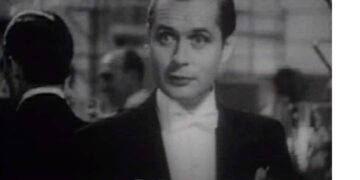P.G. Wodehouse, born on October 15, 1881, in Guildford, Surrey, was an English author and one of the most influential comedic writers of the 20th century. His witty and clever works have not only left an indelible mark on literature but have also had a significant impact on the world of film and entertainment. Even though Wodehouse passed away in 1975, his legacy is still alive and continues to captivate audiences around the globe.
P.G. Wodehouse’s biography and his impact on literature
Pelham Grenville Wodehouse, known as P.G. Wodehouse, had a remarkable career spanning over seven decades. He began writing at an early age and quickly gained recognition for his humorous and satirical style. Wodehouse’s novels, short stories, and plays often revolved around the lives of the British upper class, providing a lighthearted escape from the realities of the time.
Wodehouse’s unique writing style and his ability to create memorable characters have made him a literary icon. His works continue to be celebrated for their timeless humor and wit. Many contemporary authors, such as Douglas Adams and Terry Pratchett, have cited Wodehouse as a major influence on their own writing.
Exploring the love life and friendships of P.G. Wodehouse
Beyond his literary achievements, P.G. Wodehouse had a fascinating personal life filled with love and friendship. Despite facing some controversies in his later years, Wodehouse was a man of strong character and loyal friendships. His relationships with his wife, Ethel, and his close friend and collaborator, Guy Bolton, greatly influenced his work and provided inspiration for many of his characters.
Wodehouse’s romantic escapades and his ability to capture the complexities of human relationships added depth to his writing. The themes of love, friendship, and loyalty are recurring motifs throughout his works, endearing him to readers who appreciate the intricacies of human connections.
The rich and poor characters in P.G. Wodehouse’s comics
One of the distinctive features of P.G. Wodehouse’s comics is the portrayal of characters from both the upper and lower classes. His stories often juxtapose the lives of the wealthy elite with the struggles of the working class, creating a delightful comedic contrast.
Wodehouse’s rich characters are often depicted as eccentric and clueless, providing ample comedic material. On the other hand, his poor characters are portrayed with warmth and empathy, showcasing their resilience and resourcefulness. This balance between social classes adds depth to Wodehouse’s narratives and allows readers to explore the complexities of human nature.
Uncovering hidden gems and trivia about P.G. Wodehouse’s work
As a prolific writer, P.G. Wodehouse left behind a treasure trove of hidden gems and trivia for his fans to discover. From obscure references to real-life events to clever wordplay, Wodehouse’s works are filled with subtle details that add an extra layer of enjoyment to his readers.
For example, in his novel “Joy in the Morning,” Wodehouse makes a reference to the Titanic disaster, showcasing his ability to incorporate current events into his narratives. Additionally, his use of clever wordplay and puns, such as the recurring character names “Bertie Wooster” and “Jeeves,” adds to the whimsical nature of his storytelling.
The best quotes from P.G. Wodehouse’s comics
P.G. Wodehouse’s comics are a treasure trove of witty and memorable quotes. His clever turns of phrase and humorous observations have become iconic in the world of literature. Here are five of the best quotes from his works:
- “It is a good rule in life never to apologize. The right sort of people do not want apologies, and the wrong sort take a mean advantage of them.” – From “The Man with Two Left Feet”
- “He had just about enough intelligence to open his mouth when he wanted to eat, but certainly no more.” – From “Right Ho, Jeeves”
- “She looked as if she had been poured into her clothes and had forgotten to say ‘when’.” – From “The Code of the Woosters”
- “I always advise people never to give advice.” – From “The Mating Season”
- “He had the look of one who had drunk the cup of life and found a dead beetle at the bottom.” – From “The Adventures of Sally”
These quotes exemplify Wodehouse’s talent for blending humor with keen observations of human behavior, making his works a delight to read.
Main settings of P.G. Wodehouse’s comics
P.G. Wodehouse’s comics transport readers to a world of grand estates, bustling cities, and quaint English villages. The vivid settings of his stories provide a backdrop for his lively characters and humorous escapades.
One of the main settings in Wodehouse’s comics is the fictional Blandings Castle. This grand estate, located in the Shropshire countryside, serves as the backdrop for many of his most beloved stories, including “Something Fresh” and “Heavy Weather.” Blandings Castle is known for its quirky residents, comical misunderstandings, and the ongoing battle to preserve the purity of the prize-winning pig, the Empress of Blandings.
In addition to Blandings Castle, Wodehouse’s stories often take place in the bustling metropolis of London. The city serves as a vibrant backdrop for the adventures of his characters, providing ample opportunities for comedic mishaps and social satire.
The first and last comics by P.G. Wodehouse
P.G. Wodehouse’s first comic, “The Pothunters,” was published in 1902. This early work showcased his talent for creating entertaining and relatable characters, even at the beginning of his career. “The Pothunters” follows the misadventures of a group of schoolboys at a fictional English boarding school, highlighting the humor and camaraderie that would become trademarks of Wodehouse’s writing.
On the other hand, Wodehouse’s last comic, “Sunset at Blandings,” was published posthumously in 1977. This final installment in the Blandings Castle series provides a fitting conclusion to the beloved saga and showcases Wodehouse’s enduring appeal as a writer.
The order of P.G. Wodehouse’s comics
P.G. Wodehouse’s comics span a vast collection of works, making it essential for fans to know the order in which they were published. While each comic can be enjoyed as a standalone story, reading them in chronological order provides a deeper appreciation for the development of Wodehouse’s characters and storytelling style.
Here is the chronological order of some of Wodehouse’s most popular comics:
- “The Pothunters” (1902)
- “A Prefect’s Uncle” (1903)
- “Tales of St. Austin’s” (1903)
- “The Gold Bat” (1904)
- “The Head of Kay’s” (1905)
Reading Wodehouse’s comics in order allows readers to witness the evolution of his writing and the growth of his beloved characters.
The screen adaptation of “Piccadilly Jim” and other films based on P.G. Wodehouse’s work
P.G. Wodehouse’s comics have not only captivated readers but have also made their way onto the silver screen. One notable screen adaptation of his work is the film “Piccadilly Jim,” released in 2004. This romantic comedy-drama stars Sam Rockwell and Frances O’Connor and brings to life the charming and humorous world of Wodehouse’s characters.
In addition to “Piccadilly Jim,” several other films have been adapted from Wodehouse’s work, including “Thank You, Jeeves!” and “The Girl on the Boat.” These screen adaptations bring Wodehouse’s vibrant characters and comedic situations to a wider audience, further cementing his influence on film and entertainment.
Other artists who inspired P.G. Wodehouse
While P.G. Wodehouse’s comedic genius is unparalleled, he, too, drew inspiration from other artists and writers. One such notable influence on Wodehouse’s work was the iconic humorist Mark Twain. Wodehouse admired Twain’s ability to blend satire with humor and incorporate social commentary into his narratives.
Another artist who inspired Wodehouse was the playwright and composer, Sir Arthur Sullivan. Wodehouse greatly admired Sullivan’s ability to create witty and catchy songs, and he often incorporated elements of musical comedy into his own works.
Recommended writers and comics for fans of P.G. Wodehouse
If you are a fan of P.G. Wodehouse and are looking for similar authors and comics to explore, here are five recommendations that capture the same wit and charm:
- Evelyn Waugh – Known for his satirical novels, such as “Decline and Fall” and “Brideshead Revisited,” Waugh’s works beautifully blend comedy and social commentary.
- Nancy Mitford – Mitford’s novels, including “The Pursuit of Love” and “Love in a Cold Climate,” transport readers into the world of the British upper class with her sharp wit and humor.
- Jerome K. Jerome – Jerome’s classic comic novel, “Three Men in a Boat,” is a hilarious account of a boating trip along the River Thames, filled with witty observations and humorous anecdotes.
- Terry Pratchett – Pratchett’s Discworld series, starting with “The Colour of Magic,” offers a delightful blend of fantasy and satire, reminiscent of Wodehouse’s ability to create vivid characters and comedic situations.
- Stella Gibbons – Gibbons’ novel “Cold Comfort Farm” is a humorous parody of rural melodramas, showcasing her talent for witty dialogue and quirky characters.
These authors and comics share Wodehouse’s gift for humor and provide an enjoyable reading experience for fans of his work.
Conclusion: P.G. Wodehouse’s lasting impact on film, entertainment, and literature
In conclusion, P.G. Wodehouse’s extraordinary influence on film and entertainment is a testament to his timeless humor and wit. His richly developed characters, clever wordplay, and insightful observations have resonated with audiences for generations. Whether through his written works or their screen adaptations, Wodehouse continues to captivate readers and viewers alike.
From his early comics to his final contributions, Wodehouse’s legacy as a comedic genius remains intact. His ability to navigate the complexities of human relationships, his witty dialogue, and his portrayal of both the rich and the poor have made his works not only entertaining but also thought-provoking.
As fans of P.G. Wodehouse, we can continue to celebrate his extraordinary contributions to literature and entertainment by exploring his vast collection of comics, discovering hidden gems and trivia, and diving into the works of other talented writers who have been inspired by his genius. So, grab a Wodehouse novel, immerse yourself in his world of humor, and enjoy the laughter that his work brings.









